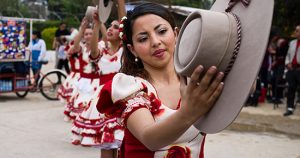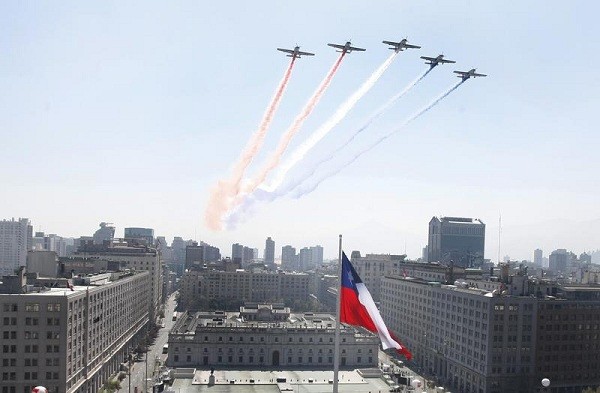
The most important, festive, and purely Chilean holiday is the week of Fiestas Patrias. Fiestas Patrias is the name of the 18th and 19th of September, which mark the historical beginning of the independence process for Chile and celebrate the Chilean armed forces, respectively. This is by far the most wildly celebrated annual event.
Depending on where the two days fall in the week, the government of Chile may declare one or more other weekdays off, creating an extended weekend of celebrations. Most people who work in Santiago go home early on September 17th, and begin the holiday by having an once (teatime) of empanadas and red wine with their families. Millions from Santiago- a city of over six million people- travel to other parts of Chile. Santiago is both tranquil and alive with celebration simultaneously, and the rest of Chile celebrates as well. Nonetheless, it is helpful to be aware of the inflated prices of travel within Chile during or near Fiestas Patrias.
There are many ways to experience Fiestas Patrias in Santiago. They almost all include some variation on barbeque food, folk music and dance called La Cueca Chilena, and Chilean wine. It is advised to visit at least one fonda, public celebrations typically held in temporary venues. Some of the most famous ones are at Parque Padre Hurtado and Parque Inéz de Suárez, but there are dozens more throughout Santiago. They usually cost $2.000-3.000 Chilean Pesos to enter, and some of the most economical only require you to pay once for the duration of the festivities.
Inside a fonda, menus of empanadas, barbequed meats skewered with breads, and sweets like alfajores are found. The most popular drink is Chilean red wine, and the most traditional is the lightly alcoholic chicha– a cider drink made from corn or apples. Pisco, the national spirit of Chile, is served with soda and in cocktails. Showing Chilean tradition and culture is very important throughout meals and parties during Fiestas Patrias. Music and dancing is constantly present. Most children and many adults don traditional Chilean western wear to perform the national music and dances- the Cueca Chilena being a flirtation between dance partners.
Chilean rodeo, performed by the cowboys known as huasos in traditional garb, is also a popular event that can be viewed at some of the larger fondas. This rodeo tradition is unlike any other, and champions are determined by how they strike a loosed calf while on horseback. Like other nations’ rodeo and bullfighting, Chilean rodeo has faced criticism from the animal welfare movement. It is resultantly strictly regulated for the safety of the animals and participants, and can only be performed in traditional attire for nationalistic celebrations.
The military holds a grand and widely broadcasted parade in Parque O’Higgins on the afternoon of September 19th, which officially marks the end of Fiestas Patrias. In reality, this “official” end of the celebration is rarely acknowledged, and celebrations often continue in one form or another until everyone needs to return to work the following week- rested, happy, and ready for the springtime.
